2023年中考英语专题复习:一般现在时 课件(共30张PPT)
文档属性
| 名称 | 2023年中考英语专题复习:一般现在时 课件(共30张PPT) |

|
|
| 格式 | pptx | ||
| 文件大小 | 40.1MB | ||
| 资源类型 | 教案 | ||
| 版本资源 | 通用版 | ||
| 科目 | 英语 | ||
| 更新时间 | 2023-11-27 14:31:02 | ||
图片预览

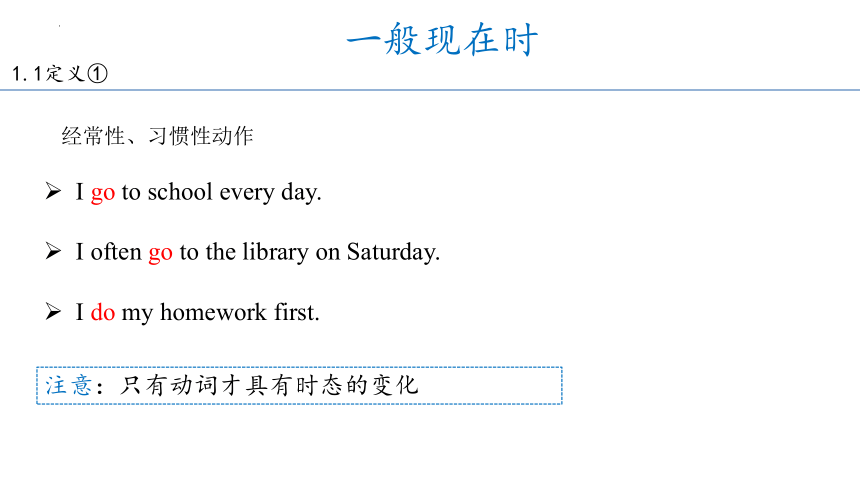
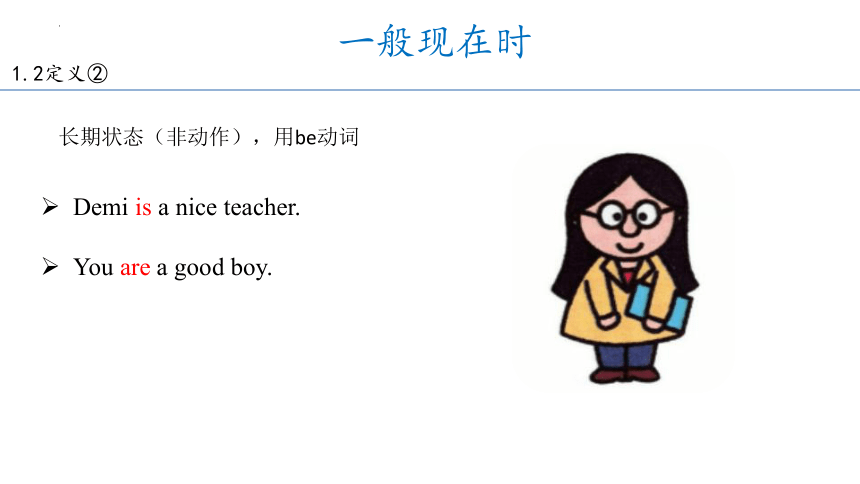
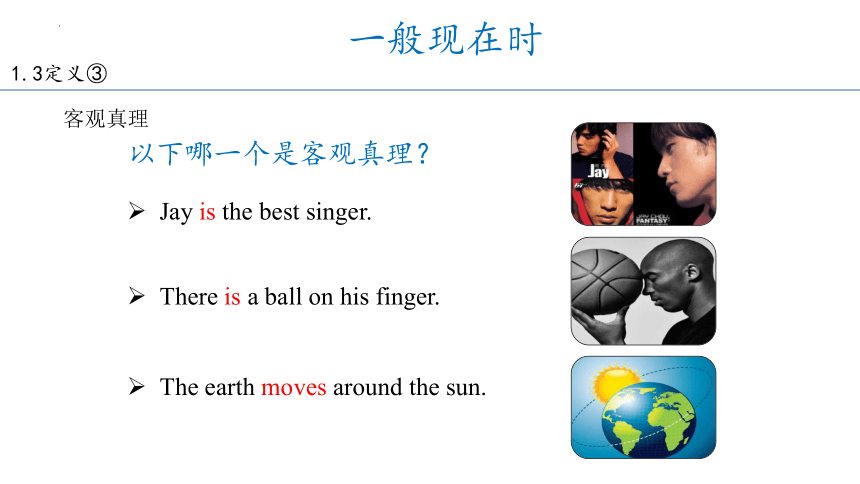
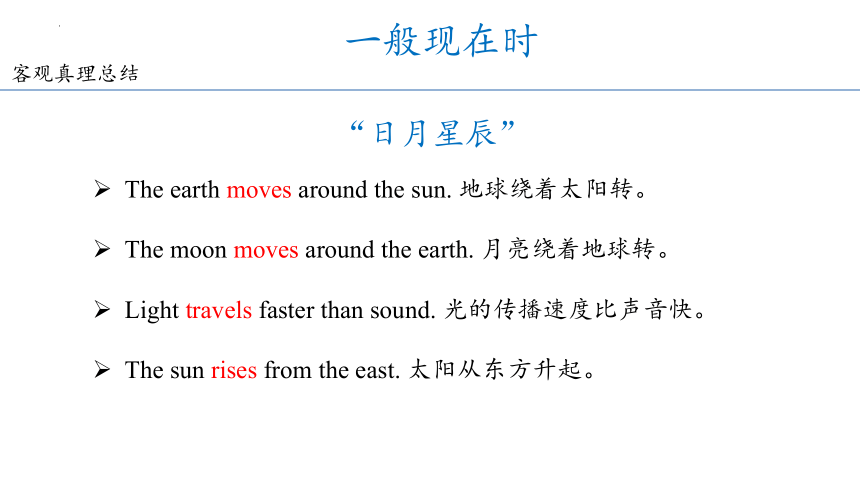
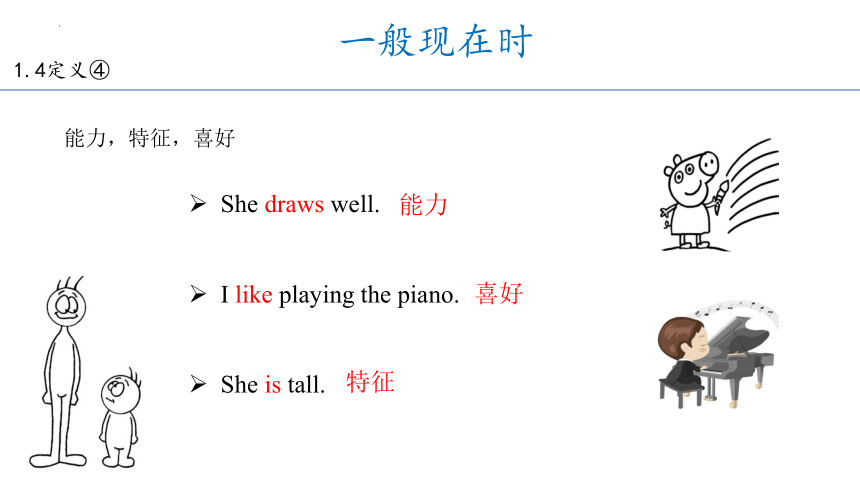
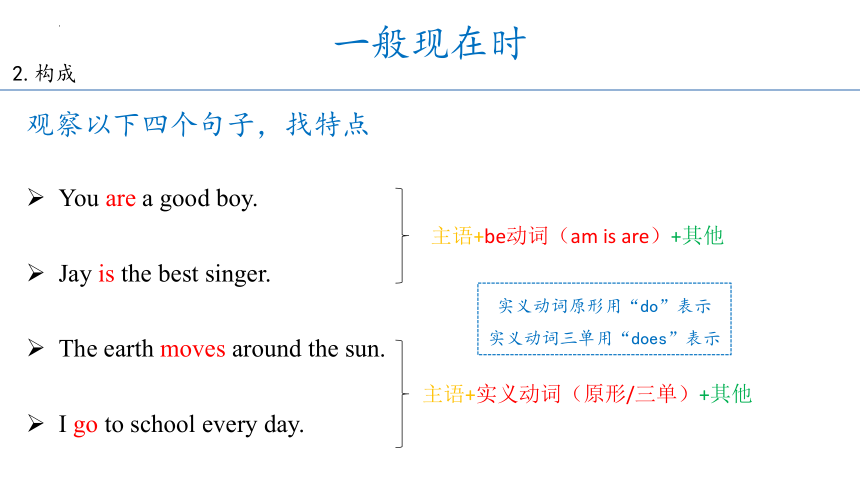
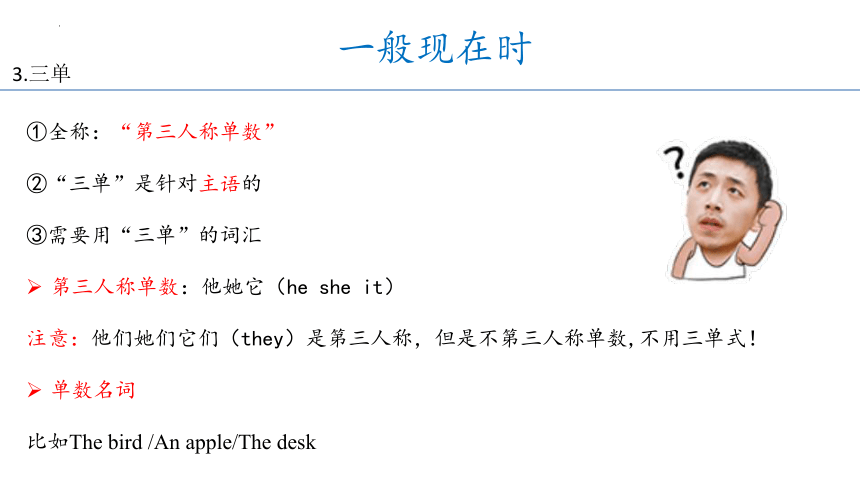
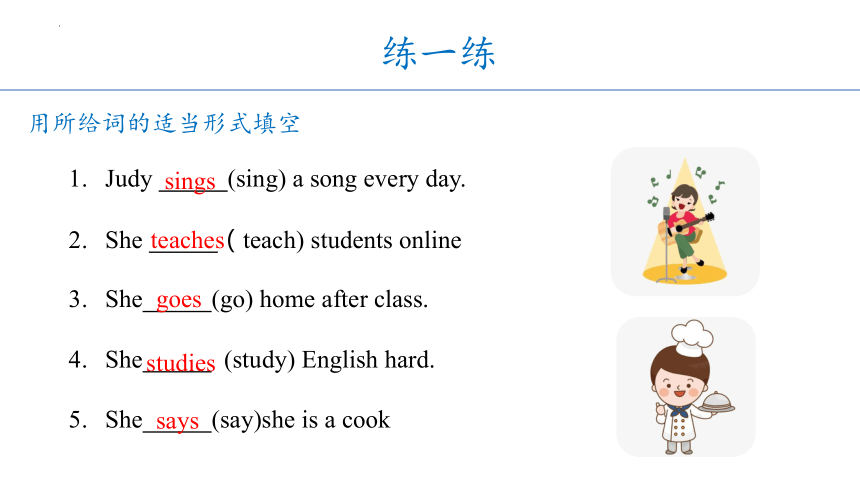
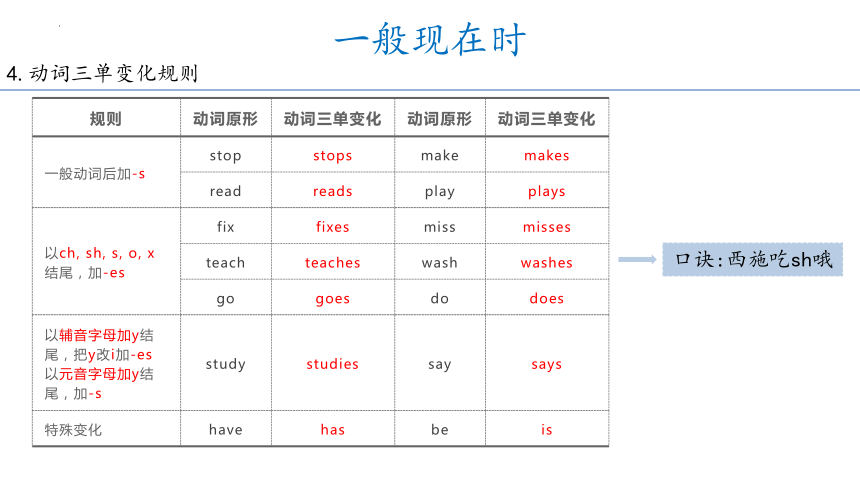
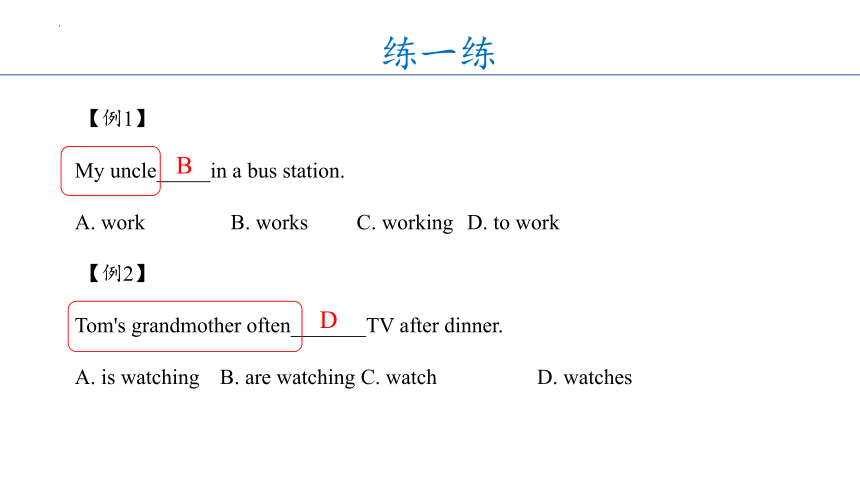
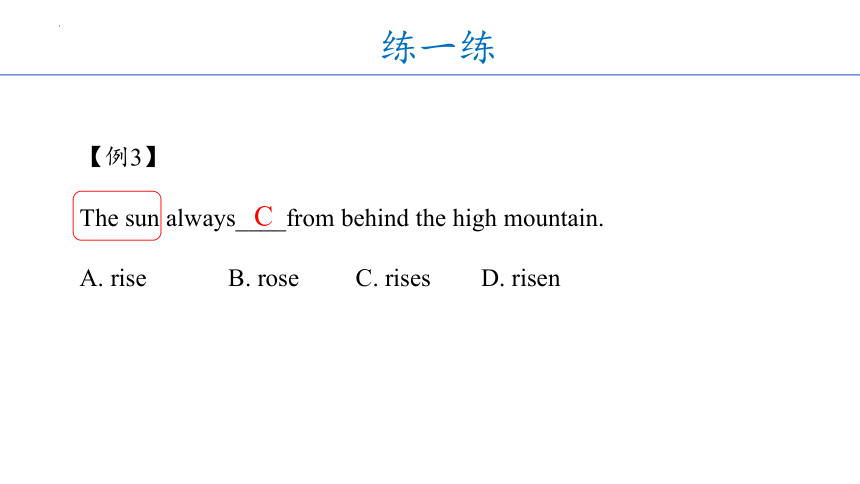
文档简介
(共30张PPT)
一般现在时
Grammar课堂之
I go to school every day.
I often go to the library on Saturday.
I do my homework first.
一般现在时
1.1定义①
经常性、习惯性动作
注意:只有动词才具有时态的变化
Demi is a nice teacher.
You are a good boy.
一般现在时
1.2定义②
长期状态(非动作),用be动词
以下哪一个是客观真理?
Jay is the best singer.
There is a ball on his finger.
The earth moves around the sun.
一般现在时
1.3定义③
客观真理
客观真理总结
一般现在时
The earth moves around the sun. 地球绕着太阳转。
The moon moves around the earth. 月亮绕着地球转。
Light travels faster than sound. 光的传播速度比声音快。
The sun rises from the east. 太阳从东方升起。
“日月星辰”
She draws well.
I like playing the piano.
She is tall.
一般现在时
1.4定义④
能力,特征,喜好
能力
喜好
特征
一般现在时
观察以下四个句子,找特点
You are a good boy.
Jay is the best singer.
The earth moves around the sun.
I go to school every day.
2.构成
主语+实义动词(原形/三单)+其他
主语+be动词(am is are)+其他
实义动词原形用“do”表示
实义动词三单用“does”表示
①全称:“第三人称单数”
②“三单”是针对主语的
③需要用“三单”的词汇
第三人称单数:他她它(he she it)
注意:他们她们它们(they)是第三人称,但是不第三人称单数,不用三单式!
单数名词
比如The bird /An apple/The desk
一般现在时
3.三单
Judy (sing) a song every day.
She (teach) students online
She (go) home after class.
She (study) English hard.
She (say)she is a cook
练一练
goes
sings
teaches
says
studies
用所给词的适当形式填空
一般现在时
4.动词三单变化规则
口诀:西施吃sh哦
规则 动词原形 动词三单变化 动词原形 动词三单变化
一般动词后加-s stop stops make makes
read reads play plays
特殊变化 have has be is
以ch, sh, s, o, x结尾,加-es fix fixes miss misses
teach teaches wash washes
go goes do does
以辅音字母加y结尾,把y改i加-es 以元音字母加y结尾,加-s study studies say says
【例1】
My uncle_____in a bus station.
A. work B. works C. working D. to work
【例2】
Tom's grandmother often_______TV after dinner.
A. is watching B. are watching C. watch D. watches
练一练
B
D
【例3】
The sun always____from behind the high mountain.
A. rise B. rose C. rises D. risen
C
练一练
every day 每天?
always/often....never ?
yesterday 昨天?
on Sunday 在周日?
on Sundays 每周日?
once a week一周一次
一般现在时?
标志词
every day
always/often...never
yesterday 过去时
on Sunday 过去式、将来时
on Sundays
once a week
一般现在时
5.标志词
小结
every系列
频率副词 always--never
每周几 on Fridays/Sundays/weekends
多久几次 once a week 、three times a year
一般现在时
5.标志词
练一练
【例4】
John, Nick and I are friends. We after class every day.
A. is playing B. are playing C. plays D. play
【例5】
Mike's father in the hospital and he is very busy every day.
A. work B. works C. working D. to work
C
B
一般现在时
6-1.句型转换◎否定句/一般疑问句/回答
Demi is beautiful and clever.
否定句:
Demi is not beautiful and clever.
一般疑问句:
Is Demi beautiful and clever
回答:
肯定回答:Yes, she is.
否定回答:No, she isn't.
be动词 肯定句 am/is/are
否定句 be+not
一般疑问句 be提前
回答 Yes,sb be
No,sb be not
=isn't(看情况)
口诀1:有be提be
只能用是/否来回答
知识充电站
没有特殊疑问词的疑问句叫一般疑问句?
定义:只能够用“是”或“否”回答是的句子
(×)
什么叫一般疑问句?
一般现在时
6-1.句型转换◎否定句/一般疑问句/回答
Demi/She sings well
否定句:
Demi/She doesn't sing well.
一般疑问句:
Does Demi/she sing well?
回答:
肯定回答:Yes, she does.
否定回答:No, she doesn't.
实义动词 肯定句 do/does
否定句 don't/doesn't+do
一般疑问句 Do/Does sb do
回答 Yes,sb do/does
No,sb don't/doesn't
口诀2:无be求助
只能用是/否来回答
一
句
至多
一
三
单
句型转换
练一练
1.We like Demi very much.
否定句:
We don't like Demi very much.
一般疑问句:
Do you like Demi very much
回答:
肯定回答:Yes, we do.
否定回答:No, we don't.
2.I study hard.
否定句:
I don't study hard.
一般疑问句:
Do you study hard
回答:
肯定回答:Yes, I do.
否定回答:No, I don't.
注意:变疑问句we和I要变成you
3.GD is a dog.
否定句:
GD isn't a dog.
一般疑问句:
Is GD a dog
回答:
Yes, it is.
No, it isn't.
4.Tom wants some work.
否定句:
Tom doesn't want any work.
一般疑问句:
Does Tom want any work
回答:
Yes, he does.
No,he doesn't
练一练
句型转换
【例1】
--Does your sister______a basketball
--Yes, she_________.
A. have; has B. have; does C. has; has D. has; does
【例2】
Paul is crazy about basketball, but he _________football very often.
A. doesn't play B. isn't playing C. didn't play D. won t play
D
练一练
A
特殊疑问句
Demi teach students with books in the room at 10:00am.
1.Demi teach students with books in the room at 10:00am.
好奇:人who
2.Demi teach students with books in the room at 10:00am.
好奇:事what
3.Demi teach students with books in the room at 10:00am.
好奇:人who
4.Demi teach students with books in the room at 10:00am.
好奇:方式how
5.Demi teach students with books in the room at 10:00am.
好奇:地点where
6.Demi teach students with books in the room at 10:00am .
好奇:时间when
特殊疑问词
提问人:who
提问事:what
提问方式/程度:how
提问地点:where
提问时间:when(=what time)
提问原因:why
6-2.句型转换◎对划线部分提问
对划线部分进行提问
1.We like Demi very much.
?like Demi very much.
Who likes Demi very much
2.We like Demi very much.
Do you like Demi very much?
Do you like Demi very much
Who do you like very much
1.对主语提问 :Who + 剩余部分 (注意:who 作主语默认三单)
2.对非主语提问:疑问词 + 一般疑问句
口诀:一般先斩后奏
一般:
先斩:
后奏:
Who
6-2.句型转换◎对划线部分提问
特殊疑问句
对划线部分进行提问
3.We like Demi very much.
Do you like Demi very much?
Do do you like Demi very much
How do you like Demi
特殊疑问句
一般:
先斩:
后奏:
How
对非主语提问:疑问词 + 一般疑问句
口诀:一般先斩后奏
对划线部分进行提问
4.I cook at the kitchen every day.
Do you cook at the kitchen every day?
Do you cook at the kitchen every day?
What do you do at the kitchen every day?
5.I cook at the kitchen every day.
Do you cook at the kitchen every day?
Do you cook at the kitchen every day?
Where do you cook at the kitchen every day
特殊疑问句
一般:
先斩:
后奏:
一般:
先斩:
后奏:
where
what
对非主语提问:疑问词 + 一般疑问句
口诀:一般先斩后奏
(注:动词被划掉要用 do 代替)
1.We have three meals every day.
What do you do every day
How many meals do you have every day
2.We have three meals every day.
What do you do every day
How many meals do you have every day
3.We play basketball every day.
What do you do every day
What do you play every day
4.We play basketball every day.
What do you do every day
What do you play every day
特殊疑问句
√
√
√
√
超级大坑
特殊疑问词
提问人:who
提问事:what
提问方式/程度:how
提问地点:where
提问时间:when(=what time)
提问原因:why
2.对非主语提问:疑问词 + 一般疑问句
口诀:一般先斩后奏
1.对主语提问 :Who + 剩余部分 (注意:who 作主语默认三单)
特殊疑问句
小结
练习
对划线部分进行提问
I like Jay very much.
I like Jay very much.
Who likes Jay very much
I like Jay very much.
Who do you like very much
I like Jay very much.
How do you like Jay
小结
一般现在时
经常性、习惯性动作
长期的状态
客观真理:日月星辰
能力、特征、喜好
一般现在时
1.四大定义
2.构成
主语+be动词(am is are)+其他
主语+实义动词(原形/三单)+其他
3.三单
第三人称单数
一般-s
x,s,ch,sh,o +es
辅y,去y加-ies
元y,加-s
have-has,be-is
单数名词
4.动词三单变化规则
5.标志词
频率
6.句型转化
否定句/一般疑问句/回答: 有be提be,无be求助
对划线部分提问:特殊疑问句
对主语提问:who+其他
对非主语提问:一般先斩后奏
特殊疑问词
附:一般现在时考点思维导图
一般现在时
Grammar课堂之
I go to school every day.
I often go to the library on Saturday.
I do my homework first.
一般现在时
1.1定义①
经常性、习惯性动作
注意:只有动词才具有时态的变化
Demi is a nice teacher.
You are a good boy.
一般现在时
1.2定义②
长期状态(非动作),用be动词
以下哪一个是客观真理?
Jay is the best singer.
There is a ball on his finger.
The earth moves around the sun.
一般现在时
1.3定义③
客观真理
客观真理总结
一般现在时
The earth moves around the sun. 地球绕着太阳转。
The moon moves around the earth. 月亮绕着地球转。
Light travels faster than sound. 光的传播速度比声音快。
The sun rises from the east. 太阳从东方升起。
“日月星辰”
She draws well.
I like playing the piano.
She is tall.
一般现在时
1.4定义④
能力,特征,喜好
能力
喜好
特征
一般现在时
观察以下四个句子,找特点
You are a good boy.
Jay is the best singer.
The earth moves around the sun.
I go to school every day.
2.构成
主语+实义动词(原形/三单)+其他
主语+be动词(am is are)+其他
实义动词原形用“do”表示
实义动词三单用“does”表示
①全称:“第三人称单数”
②“三单”是针对主语的
③需要用“三单”的词汇
第三人称单数:他她它(he she it)
注意:他们她们它们(they)是第三人称,但是不第三人称单数,不用三单式!
单数名词
比如The bird /An apple/The desk
一般现在时
3.三单
Judy (sing) a song every day.
She (teach) students online
She (go) home after class.
She (study) English hard.
She (say)she is a cook
练一练
goes
sings
teaches
says
studies
用所给词的适当形式填空
一般现在时
4.动词三单变化规则
口诀:西施吃sh哦
规则 动词原形 动词三单变化 动词原形 动词三单变化
一般动词后加-s stop stops make makes
read reads play plays
特殊变化 have has be is
以ch, sh, s, o, x结尾,加-es fix fixes miss misses
teach teaches wash washes
go goes do does
以辅音字母加y结尾,把y改i加-es 以元音字母加y结尾,加-s study studies say says
【例1】
My uncle_____in a bus station.
A. work B. works C. working D. to work
【例2】
Tom's grandmother often_______TV after dinner.
A. is watching B. are watching C. watch D. watches
练一练
B
D
【例3】
The sun always____from behind the high mountain.
A. rise B. rose C. rises D. risen
C
练一练
every day 每天?
always/often....never ?
yesterday 昨天?
on Sunday 在周日?
on Sundays 每周日?
once a week一周一次
一般现在时?
标志词
every day
always/often...never
yesterday 过去时
on Sunday 过去式、将来时
on Sundays
once a week
一般现在时
5.标志词
小结
every系列
频率副词 always--never
每周几 on Fridays/Sundays/weekends
多久几次 once a week 、three times a year
一般现在时
5.标志词
练一练
【例4】
John, Nick and I are friends. We after class every day.
A. is playing B. are playing C. plays D. play
【例5】
Mike's father in the hospital and he is very busy every day.
A. work B. works C. working D. to work
C
B
一般现在时
6-1.句型转换◎否定句/一般疑问句/回答
Demi is beautiful and clever.
否定句:
Demi is not beautiful and clever.
一般疑问句:
Is Demi beautiful and clever
回答:
肯定回答:Yes, she is.
否定回答:No, she isn't.
be动词 肯定句 am/is/are
否定句 be+not
一般疑问句 be提前
回答 Yes,sb be
No,sb be not
=isn't(看情况)
口诀1:有be提be
只能用是/否来回答
知识充电站
没有特殊疑问词的疑问句叫一般疑问句?
定义:只能够用“是”或“否”回答是的句子
(×)
什么叫一般疑问句?
一般现在时
6-1.句型转换◎否定句/一般疑问句/回答
Demi/She sings well
否定句:
Demi/She doesn't sing well.
一般疑问句:
Does Demi/she sing well?
回答:
肯定回答:Yes, she does.
否定回答:No, she doesn't.
实义动词 肯定句 do/does
否定句 don't/doesn't+do
一般疑问句 Do/Does sb do
回答 Yes,sb do/does
No,sb don't/doesn't
口诀2:无be求助
只能用是/否来回答
一
句
至多
一
三
单
句型转换
练一练
1.We like Demi very much.
否定句:
We don't like Demi very much.
一般疑问句:
Do you like Demi very much
回答:
肯定回答:Yes, we do.
否定回答:No, we don't.
2.I study hard.
否定句:
I don't study hard.
一般疑问句:
Do you study hard
回答:
肯定回答:Yes, I do.
否定回答:No, I don't.
注意:变疑问句we和I要变成you
3.GD is a dog.
否定句:
GD isn't a dog.
一般疑问句:
Is GD a dog
回答:
Yes, it is.
No, it isn't.
4.Tom wants some work.
否定句:
Tom doesn't want any work.
一般疑问句:
Does Tom want any work
回答:
Yes, he does.
No,he doesn't
练一练
句型转换
【例1】
--Does your sister______a basketball
--Yes, she_________.
A. have; has B. have; does C. has; has D. has; does
【例2】
Paul is crazy about basketball, but he _________football very often.
A. doesn't play B. isn't playing C. didn't play D. won t play
D
练一练
A
特殊疑问句
Demi teach students with books in the room at 10:00am.
1.Demi teach students with books in the room at 10:00am.
好奇:人who
2.Demi teach students with books in the room at 10:00am.
好奇:事what
3.Demi teach students with books in the room at 10:00am.
好奇:人who
4.Demi teach students with books in the room at 10:00am.
好奇:方式how
5.Demi teach students with books in the room at 10:00am.
好奇:地点where
6.Demi teach students with books in the room at 10:00am .
好奇:时间when
特殊疑问词
提问人:who
提问事:what
提问方式/程度:how
提问地点:where
提问时间:when(=what time)
提问原因:why
6-2.句型转换◎对划线部分提问
对划线部分进行提问
1.We like Demi very much.
?like Demi very much.
Who likes Demi very much
2.We like Demi very much.
Do you like Demi very much?
Do you like Demi very much
Who do you like very much
1.对主语提问 :Who + 剩余部分 (注意:who 作主语默认三单)
2.对非主语提问:疑问词 + 一般疑问句
口诀:一般先斩后奏
一般:
先斩:
后奏:
Who
6-2.句型转换◎对划线部分提问
特殊疑问句
对划线部分进行提问
3.We like Demi very much.
Do you like Demi very much?
Do do you like Demi very much
How do you like Demi
特殊疑问句
一般:
先斩:
后奏:
How
对非主语提问:疑问词 + 一般疑问句
口诀:一般先斩后奏
对划线部分进行提问
4.I cook at the kitchen every day.
Do you cook at the kitchen every day?
Do you cook at the kitchen every day?
What do you do at the kitchen every day?
5.I cook at the kitchen every day.
Do you cook at the kitchen every day?
Do you cook at the kitchen every day?
Where do you cook at the kitchen every day
特殊疑问句
一般:
先斩:
后奏:
一般:
先斩:
后奏:
where
what
对非主语提问:疑问词 + 一般疑问句
口诀:一般先斩后奏
(注:动词被划掉要用 do 代替)
1.We have three meals every day.
What do you do every day
How many meals do you have every day
2.We have three meals every day.
What do you do every day
How many meals do you have every day
3.We play basketball every day.
What do you do every day
What do you play every day
4.We play basketball every day.
What do you do every day
What do you play every day
特殊疑问句
√
√
√
√
超级大坑
特殊疑问词
提问人:who
提问事:what
提问方式/程度:how
提问地点:where
提问时间:when(=what time)
提问原因:why
2.对非主语提问:疑问词 + 一般疑问句
口诀:一般先斩后奏
1.对主语提问 :Who + 剩余部分 (注意:who 作主语默认三单)
特殊疑问句
小结
练习
对划线部分进行提问
I like Jay very much.
I like Jay very much.
Who likes Jay very much
I like Jay very much.
Who do you like very much
I like Jay very much.
How do you like Jay
小结
一般现在时
经常性、习惯性动作
长期的状态
客观真理:日月星辰
能力、特征、喜好
一般现在时
1.四大定义
2.构成
主语+be动词(am is are)+其他
主语+实义动词(原形/三单)+其他
3.三单
第三人称单数
一般-s
x,s,ch,sh,o +es
辅y,去y加-ies
元y,加-s
have-has,be-is
单数名词
4.动词三单变化规则
5.标志词
频率
6.句型转化
否定句/一般疑问句/回答: 有be提be,无be求助
对划线部分提问:特殊疑问句
对主语提问:who+其他
对非主语提问:一般先斩后奏
特殊疑问词
附:一般现在时考点思维导图
同课章节目录
- 词法
- 名词
- 动词和动词短语
- 动词语态
- 动词时态
- 助动词和情态动词
- 非谓语动词
- 冠词
- 代词
- 数词和量词
- 形容词副词及其比较等级
- 介词和介词短语
- 连词和感叹词
- 构词法
- 相似、相近词比较
- 句法
- 陈述句
- 一般疑问句和否定疑问句
- 特殊疑问句及选择疑问句
- 反意疑问句
- 存在句(There be句型)
- 宾语从句
- 定语从句
- 状语从句
- 主谓一致问题
- 简单句
- 并列句
- 复合句
- 主谓一致
- 主、表语从句
- 名词性从句
- 直接引语和间接引语
- 虚拟语气
- 感叹句
- 强调句
- 倒装句
- 祈使句
- 句子的成分
- 句子的分类
- 题型专区
- 单项选择部分
- 易错题
- 完形填空
- 阅读理解
- 词汇练习
- 听说训练
- 句型转换
- 补全对话
- 短文改错
- 翻译
- 书面表达
- 任务型阅读
- 语法填空
- 其他资料
